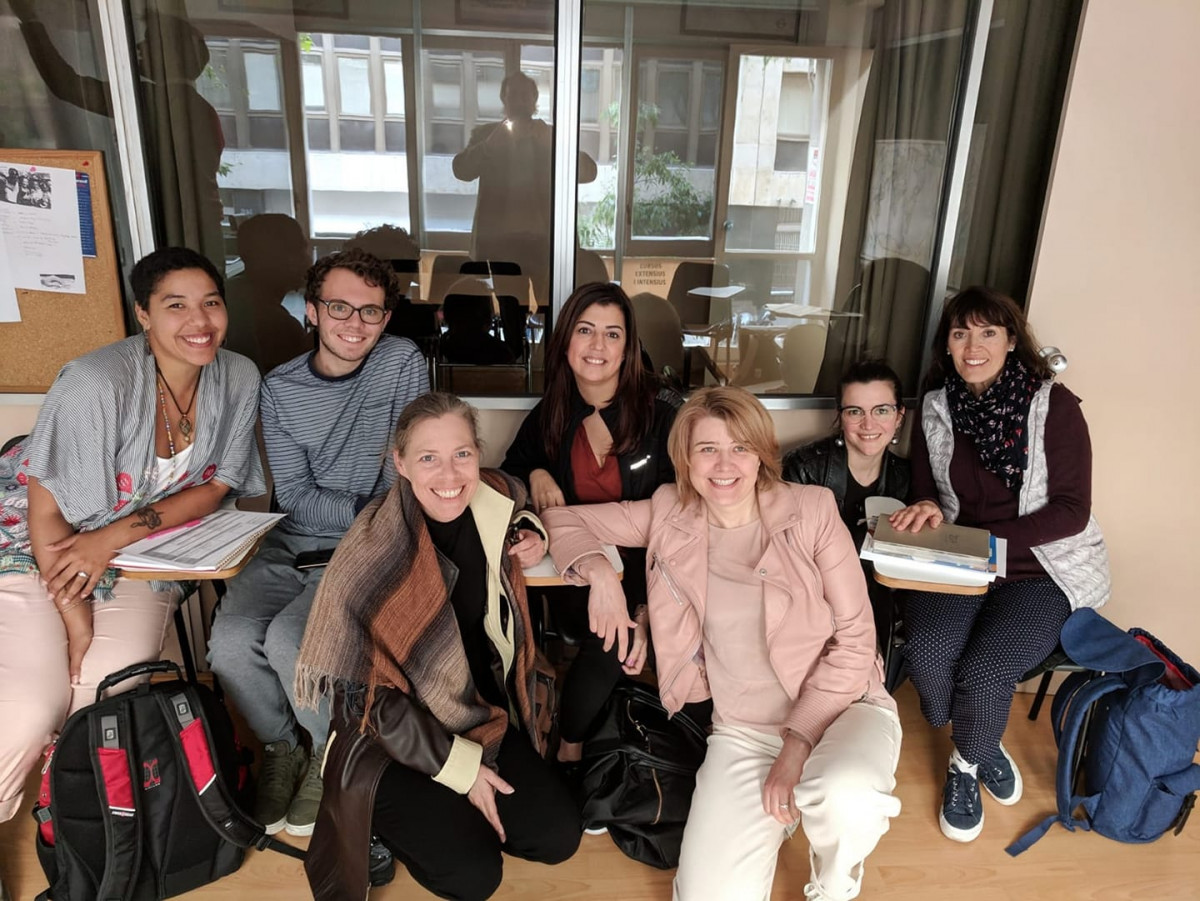Learning a foreign language as an adult
10.03.214446
FLUENCY IN FOREIGN LANGUAGE.
For many adults studying foreign languages is overwhelming. We’ve been told that we can achieve perfection in a foreign language only in childhood and we justify our failures with this statement. Meanwhile, we know many people who managed to achieve perfection in foreign languages if they had the right circumstances and a real need to do so.
Just seven years ago, had someone said I could bring my English to the level of native speakers with ease and communicate in Spanish, I'd never have believed it. But it so happened at that time, I had a strong motivation to improve English and learn Spanish. In doing so, in this story, I want to share my experience of how we, adults, can quickly improve our knowledge in the studied language. How, having achieved a basic knowledge in a new language, in as much as the next couple of months you can learn to hear natives and start speaking.
Before sharing my experience with you, I want to emphasize that in order to achieve perfection in a foreign language two conditions should match: strong motivation and high self-discipline. Everything else is indirect. Whenever you say you can't find the time or you do not have the language abilities – it is self-deception. You can always find time for what you really need. We all have the ability to learn languages if we were able to learn our mother tongue in childhood.
7 years ago, I had good English, which I first studied for a long time on language courses, then with a tutor. Many years earlier, reaching the A2 level, I was able to conduct international business, contact partners, and maintain a conversation on a familiar professional topic. As a study-abroad adviser, I made every effort to improve my own English. I could say that I had a pretty strong motivation to do so: to develop the business I needed to communicate with partners with ease and to read professional literature. Over the last 20 years, I have traveled a lot, and without good English, like everyone else, I would not feel confident being abroad.

To achieve a comfortable for communication level B2, I spent numerous short 2-4 week holidays abroad in English language schools for foreigners. I took it as a habit to read books in English though it took longer as I was trying to understand the new words, catching them out of context without using a dictionary. I had to abandon reading in Russian completely, as I had no time to do both.
For 10 years I have been making maximum efforts to improve my English, while the staff of my company, everyone recruited with a degree in foreign languages, always had better English than me. I wasn’t able to express myself fluently in writing, did not understand completely the lyrics of the songs and English movies.
7 years ago, my English progressed tremendously, and from that experience, I learned a huge lesson. At that time, I started a serious relationship with a foreigner, a native English speaker, and the fact that we spoke English 24 hours 7 days a week, served as the sharp spurt in my English fluency. I share this experience only to demonstrate that if you have a necessity in your life, a foreign language can become your second language even in adulthood.
For the last 2 years, trying to restore order in my life and start a new chapter, I began to study Spanish. Having decided at some point that I want to live in a Spanish-speaking country and looking for opportunities to keep my active nature busy and being able to engage with new local community, in the spring of 2019 I went to Barcelona to take a TEFL course (Teaching English as Foreign Language).

Four weeks of brutal hard training in the group of American students who came to Barcelona to live there and teach English, and me, Ukrainian women, who have studied the language in adulthood, became one of the biggest challenges. I had only hoped that while learning how to teach English I can still practice my Spanish. Those four weeks turned upside down my whole experience as to how we should learn foreign languages.

During my stay in Barcelona, of course, I practiced some Spanish with the locals. But, having arrived in Spain as a beginner of level A2, after 4 weeks I returned home not only with a diploma of an English teacher but with confident conversational Spanish.
The secret of my rapid progress was my constant chatting in messengers with my Spanish students in Spanish as they didn’t have enough English to do so, and Spanish audio podcasts, which I started listening to every day, bringing the listening time up to 1.5 – 2 hours a day.
Realizing with my own experience, how we should study foreign languages, I can confidently say that I am able to teach others a foreign language. No matter if it is English for the students of my country, or I would have to teach abroad or do I have to teach other languages I speak. Because having taught Spanish to me, I am sure I can teach others, especially having finished a TEFL course.
SECRETS OF FLUENCY IN FOREIGN LANGUAGE.
- Find yourself a constant companion, a native speaker for languфge exchange. In the modern world, we have thousands of opportunities to meet you online. No matter your motive, you can quickly find such a companion if you are looking for one. As an English teacher, I advise searching for platforms created for people looking for language exchange.
- Gat a habit to communicate with a native speaker for some time daily. When you find a person on the language exchange/Intercambio websites, make an arrangement that you would discuss the same topick first in one language than in another. Communication with a foreigner, who can help you and look for help to study your language, will give you more confidence. When we study a foreign language and want to bring our language skills up to elegant perfection, it turns out that we lack every day spoken language and have problems with hearing natives. The adult is afraid to speak with natives, especially over the phone, and exchange messages in the rhythm of fast conversation. Using everyday topics in conversation with natives will develop your fluency; that is when you stop thinking about how to say something but instead start thinking about what you want to say.
- When you talk to a native speaker, especially until your oral language has not reached a good fluency, use two tricks: talk with video-enabled. When you see the face of the other person it is easier to understand what he is saying. An exchange of audio messages is very helpful. If you can't understand what you hear, you can always listen to it several times. If you don't know how to say it, you can always first refer to the help of a Google translator to translate your thoughts and even to listen to intonation and pronunciation and then to repeat it in your audio message.
- Learn another language the way you learned your native language in childhood. Not with eyes but with ears. Listen to the audio. Search for podcasts that suit your interests, download them on your phone and learn to listen to them every day.
Learning a foreign language demands from us constant concentration. It is very difficult for people who work, try to find time, especially when one has a family and may lead an active lifestyle. Being a very active and busy person, I have found audio podcasts as my rescue stick. It has only been difficult to start. Not having enough level of Spanish to understand spoken audios I lost a lot of time searching for the right material that would be suitable for my level. Today, having got through this experience, I can confidently say that there are materials suitable for any language and level!
For myself, I found 2 podcasts, which responded to what I intuitively was looking for. Learning a language, not through grammar and reading texts, but understanding the new language through repetition, comprehension in context. Not studying individual words, but whole expressions. My progress with Spanish began when I found a podcast “Unlimited Spanish”. Initially, this technique seemed naive and was very uncomfortable. I fought to repeat a simple basic expression and answer naive questions which Oscar was asking in his podcast. In the podcast “Unlinited Spanish” Oscar tells the mini-stories, repeating his stories at different times. He calls this technic Point of view, meaning that he repeats the stories from the points of view of different characters.
I kept listening to Oscar only because I uploaded many episodes before the trip to Barcelona and could not find time to look for something else. I had continued to listen to Oscar mini-stories until a couple of weeks later not realized that my Spanish has progressed considerably without making any efforts.
Today, six months later, having reached a fluency to understand any audio texts or movies in Spanish, I continue to listen to Oscar’s podcasts, I even bought his audio course, because his method resonates with my vision of how we can become polyglots in adulthood.
Later, looking for how can I help my friends to improve English, I found a similar podcast for English of American teacher AJ Hoge. I must say that I have found AJ on Oscar’s referral as he said he had studied English with AJ Hoge’s audio courses. When Oscar decided to become a Spanish teacher, in my opinion, he overgrows his teacher, founding his method of delivering us vocabulary through Mini-stories and Point of View.
Where to start
Even being a specialist in education abroad with 24 years of experience but as someone who started to study languages in a quite mature age, I cannot deny that adults need to start learning a foreign language at home, with a private tutor or in a good language school.
It’s going to be much easier and less stressful to get a basic of a new language if someone can explain the structure of the new language and introduce basic phrases to you, using your own language. At the same time, I respect the communicative approach a lot and I can assure you that a good language school abroad brings you through each level in 5-8 weeks. When you study a language at home, each level takes you from 10 to 20 weeks, depending on your discipline and the frequency of classes. For adult people, for whom a job and a family come first, it is really hard to get these 1.5 – 2 months of your life to experience a foreign language in the country of native speakers.
COMMUNICATION METHODS AND LANGUAGE SCHOOLS IN COUNTRIES WHERE LANGUAGE IS SPOKEN
As I said to reach the next level in a good language school or with a tutor at home, on average you need six months with an intensity of 3 times a week. How can you pass the same volume of material, and activate new vocabulary and skills in 5-8 weeks at a language school in a country of native speakers?
- At home, you study language from 3 to (maximum) 6 hours per week, while those who had allocated more time with a teacher have no time for self-study, repetition of material at home, and homework. At a language school abroad, you have from 15 to 30 hours, or even 40 contact hours with the teacher per week, while you also are doing homework, because you already have devoted your time and spent a lot of money to achieve progress quickly.
- When you study a language at home, all that you do not understand you will ask in your native language. Even if your teacher is a native speaker, you feel more comfortable asking what you do not understand in your own language. You are afraid to look silly, say something wrong, and prefer the teacher to make an effort to understand you or use other students' help. At a language school in a country of native speakers, you have no choice; you have to make the effort and express yourself in another language that you are learning. Even if you are a beginner and your vocabulary is very limited, you will see that the teacher uses very simple language to explain the topic, while gesturing and giving many examples (which, in fact, is the communicative approach in teaching language to foreign students). You are not afraid to look ridiculous in front of other students because they all are on exactly the same level as you are.
- When you study a foreign language at home, usually the usage of a new language ends exactly when you close your textbook. If you are highly motivated and disciplined, you might try to diversify your studying by watching movies, listening to audio, and reading books. When you stay at a language school abroad, you are completely immersed in the language environment. Even if your tired brain needs a break and tries switching to your own language you can't do that because you're in a country of native speakers. Our basic need to survive and be self-esteemed pushes us to ask for directions and other explanations, we try to understand others and be understood. And the best way to practice speaking English and other languages you are learning are to meet with other students after school and for adults who consume alcohol – the most relaxed and easy conversation is over a glass of wine or beer.

For those of my readers who consider a trip to a language school abroad for quick progress please look for the platform for finding language school abroad called Study Advisor, where you'll find a whole blog dedicated to the study of foreign languages abroad in adulthood. You would be able to find a country, city, and school where to go for your next holiday. Study Advisor is a modern concept allowing you to compare multiple schools to see all the options of courses and accommodation, to quickly calculate the cost of the trip, and to book all with a Russian-speaking assistant without paying for the Agency service.
You have spent considerable time and can speak a new language at least at the elementary level? Congratulations! It's time to connect more creative techniques.
Audio podcasts and storytelling.
Find educational podcasts where the author touches upon interesting topics, tells interesting stories, with clear and understandable diction. Even better, if you already trust the author of the podcast, buy his educational audio course. Audio courses of Oscar or AJ, like their podcasts, are based on the mini-stories (storytelling), which they repeat from different points of view, each time using the new time, or simulate a conversation with you, by having questions-answers part based on the previous text. The author asks you a simple question, then pauses and offers you to make an answer. Then he answers himself and you can compare your answer with his response.
This approach gives you the opportunity to see if you have understood the text, know the answer and start to hear your voice when you are not afraid that your answer might be wrong. If you haven’t understood an audio text for the first time – it's okay to listen to it several times and each time you just guess or hear more. In good podcasts authors add texts on their websites, sometimes this is the paid version, sometimes free, or even with translation.
When you listen to the story and then answer the easy questions, the answers emerge from the consciousness, they are very easy but this approach gives you the opportunity to speak without translating from your native language and answer without hesitation.
Along with this, you will learn grammar. No one would tell you which time you need to use, but you receive a hint of why a certain story uses a certain time. The more you listen to audios, the more language comes with practicing.
Studying grammatical rules necessary for those who need to write correctly, but if you study the language in order to communicate it, you need to develop a sense of how to speak properly, what sounds right and what is not, same, that we once did, when as babies were learning to talk. You won’t have time to think about which grammatical rule you have to use if you want to speak fluently. You have to develop a sense of language.
The more you read, the more you listen to native speakers - the more you develop a sense of proficiency in the foreign language on the subconscious level.

What is good about this method? In the modern world, we don’t want to waste our time. I listen to podcasts while walking the dog or on the way home in traffic. Now I'm not nervous that the way home, instead of the normal 10 minutes takes 40 minutes in traffic because in that time I can listen to a few podcasts and not only increase my level of language but also learn something useful from the culture, political or economic life of the country of native speakers. When you use this method - you have nothing to lose.
Of course, I continue to improve my knowledge of foreign languages with the teachers, socializing with friends, watching movies, reading books, teaching students, traveling. But even reaching the level of fluency in communicating on any topic, I continue to listen to podcasts. First of all, they are interesting, second, these skills I gained will not disappear ever.
Even after a couple of months or years of not using the language you try to listen to the author you used to listen again, you would be surprised, but your vocabulary is still there, you would understand audio almost at the same level as when you listened to it the last time.


















